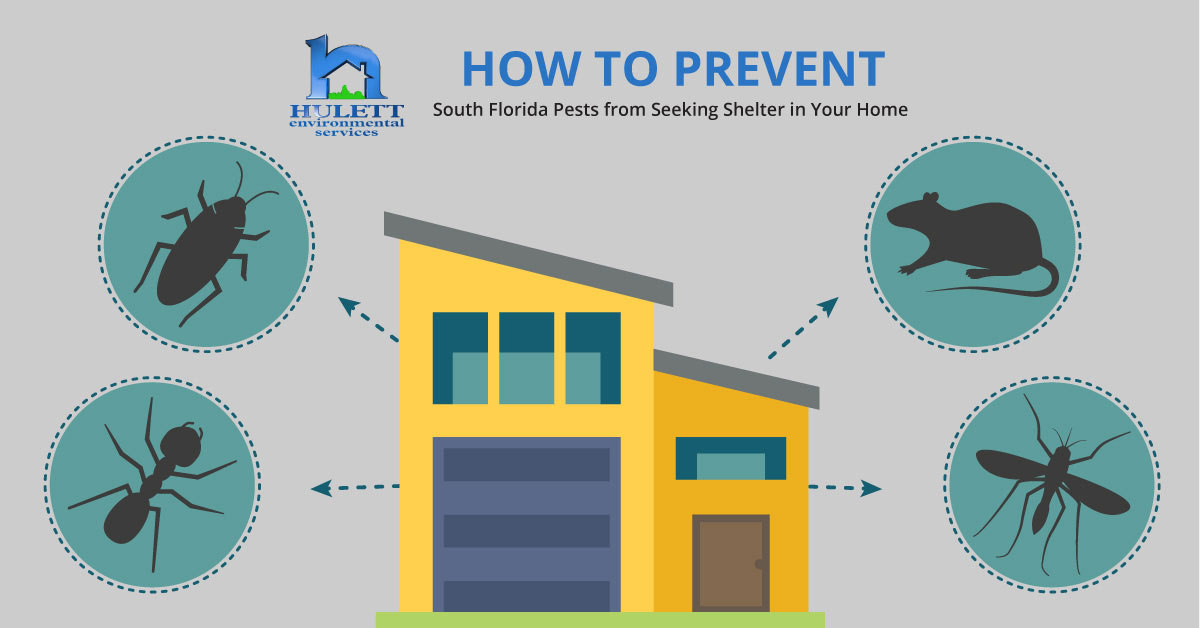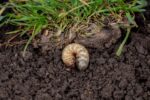
How to Prevent South Florida Pests from Seeking Shelter in Your Home
Although South Florida’s tropical environment allows her the leisure of moderate temperatures during the winter months, even cold snaps can find their way to the sunshine state. That’s when certain insects and rodents run for the shelter and warmth of your South Florida home. These household pests include carpenter ants, ghost ants, cockroaches, silverfish, ticks, roof rats and house mice. Not only are these pests annoying and inconvenient for you and your loved ones, they can also cause considerable damage to your home. Hulett Environmental Services encourages you to contact a pest professional at the first indication of insect or rodent issues in your home this winter. Pests wintering in your home can spread pathogens and disease
- Rodents carry life-threatening diseases caused by bites from vector insects, such as fleas and ticks.
- Roaches that feed on rodent droppings can cause the dangerous respiratory condition, Hantavirus, as well as allergic reactions that can trigger asthma attacks, particularly in children.
- Rodents, if startled or threatened, will bite people and pets.
- Because rats and mice reproduce at a rapid rate, rodent problems should be handled immediately by professionals, trained and certified in rodent removal and elimination.
Some pests can put your home’s structural integrity at risk and even cause electrical fires
- Carpenter ants burrowing through wood can cause as much damage as termites.
- Rodents who can chew through wood, asbestos, brick, concrete, aluminum and ½-inch thick metal, also gnaw through electrical wiring and are suspected of starting house fires.
The best way to avoid the headaches of winter pests in your home involves making your home an uninviting place for pests to enter. Along with contracting a trusted pest control company, such as Hulett to create a pest barrier around your property, you can help protect your property from pests with a few common-sense practices. Indoors, you can start by:
- Keeping food prep surfaces and dining areas clean and sanitized
- Sweeping, mopping and vacuuming floors regularly
- Sealing all open dry goods in air-tight metal, glass or hard plastic containers
- Cleaning dishes immediately after dining
- Storing leftovers and desserts in your fridge
- Using air-tight trash receptacles
- Repairing leaks in pipes and any moisture-prone areas
Taking a look at your home’s exterior, make note of places where pests like to hide or nest. Removing all debris from your home’s exterior is a great place to start creating a clean, pest-free environment that excludes pests any time of year.
- Remove all construction materials and unused plant containers.
- Keep your lawn cut short and remove areas of tall grass nearby.
- Stack firewood 20 feet away from your home, if possible.
- Reposition rocks and mulch away from your foundation.
- Trim branches away from your home and remove vines growing up your exterior walls.
Shifting focus to water-prone areas around your house, it is important to also look at areas where water is commonly found and take appropriate measures there.
- Store any toys, planters and other items that collect water in dry places.
- Repair any damp or rotting wood that makes it easier for pests to gain access to your home.
- Clean your gutters and downspouts.
- Make sure your downspouts are functioning properly to direct water away from your home.
- Remove piles of gathered leaves from the base of your home and off your property.
Now that you can see your clean foundation, seal all cracks, crevices and holes at the base of your home. This not only deters pests, but also improves your home’s energy efficiency.
- Check windows and doors for cracks and other places pests can enter your home.
- Make sure door seals are in good shape or replace worn weather stripping.
- Check crawlspaces for tight-fitting seals around openings
- Seal or caulk cracks and crevices in crawlspaces.
- Stuff small holes with steel wool to deter rodents.
Consider your roof and the upper area of your home, as well. Roof rats and flying insects can enter your home through tiny spaces.
- Repair your roof or replace as needed.
- Replace any damp or rotting flashing, fascia and eave boards.
- Check attic vents for tight seals.
Other initiatives you can take to exclude pests include:
- Keeping all trash receptacles clean and away from your home.
- Sanitizing the area around your trash receptacles.
- Moving compost piles away from your home.
- Trading out standard white exterior lightbulbs with yellow or sodium vapor lights.
- Installing storm windows. For year-round screen usage, your screens need to be intact, with no holes or tears and fit snugly.
With these pest prevention tips in mind, Hulett Environmental Services hopes you have a fun, pest-free south Florida winter. Cleaning up and repairing the exterior of your home this winter, plus keeping the interior of your home clean and sanitized goes a long way in creating a healthy place where pests can’t survive and reproduce. Come spring, you’ll be ready for the increased pest activity that comes with the season. For comprehensive pest protection, contact Hulett to design a seasonal integrated pest management plan (IPM) that uses human and pet-friendly methods and treatments to create a pest barrier around the perimeter of your property. Don’t bug out this winter, call Hulett and keep your peace of mind intact. You’ve got our Healthy Home Guarantee!



